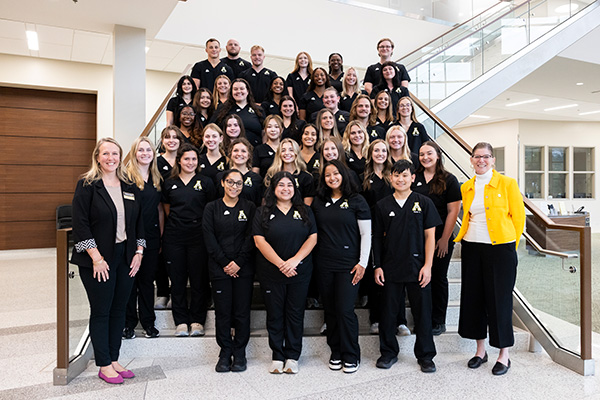BOONE, N.C. — An interdisciplinary team at Appalachian State University has received a planning grant in the amount of $715 from the North Carolina Humanities Council for their project “Decolonizing Citizenship and Indigenous Lifeways.” The team is applying for a larger grant from the National Endowment for the Humanities (NEH) to support the project.
The team is comprised of Dr. Nancy Sue Love, professor in Appalachian’s Department of Government and Justice Studies; Dr. Laura Ammon, associate professor in the university’s Department of Philosophy and Religion; Dr. Cary Fraser, associate professor in the Department of Government and Justice Studies; Karen Fletcher, director of grants resources and services in Appalachian’s Office of Research; Dr. Louis Gallien, an academic mentor for education in the university’s Honors College and former dean of Appalachian’s Reich College of Education; and Dr. Allen Bryant, associate professor in Appalachian’s Department of Curriculum and Instruction and director of the university’s Gadugi Program/Cherokee Partnership.
According to Love, “The Cherokee experience powerfully illustrates what might be called the ‘crucible of citizenship’ in American history.
“In 1838, the Cherokee were forcibly removed from their native lands on the Trail of Tears and resettled in Indian Territory. The U.S. government recognized the remaining Cherokee in North Carolina as the Eastern Band of Cherokee Indians in 1868, and the Indian Citizenship Act of 1924 granted citizenship and suffrage rights.”
In her commentary on the project, Love explains, “We will explore programs and resources at the Museum of the Cherokee Indian, consult with Dr. Barbara Duncan, education coordinator at the museum, and tour the Qualla Boundary with Gadugi Program/Cherokee Partnership students as part of the planning process for ‘Decolonizing Citizenship and Indigenous Lifeways’ — a NEH Summer Institute proposal.”
She said the project will contribute to ongoing efforts to create more inclusive curricula in American public schools and universities.
In planning the project, Love said the team will discuss several questions related to citizenship and indigeneity:
- What is the relationship between indigeneity and citizenship?
- How and where do citizenship structures and indigenous lifeways meet?
- How do strategies of colonization impact citizenship?
- How do the marks of western citizenship — blood quantum and property rights, Christianity and literacy, assimilation and classification — impact indigenous peoples?
- How does the Cherokee experience compare with those of other Native American tribes in North Carolina, such as the Lumbee and Tuscarora?
- How have indigenous peoples lived simultaneously within and beyond the borders of nation-states?
- What might their experiences contribute to redefining citizenship today in an age of transnational flows of diasporic, émigré, immigrant and refugee populations?
“Exploring these questions will contribute to our larger goals of decentering Western knowledge and exploring interdisciplinary perspectives on indigeneity and citizenship,” Love said.
Several Gadugi Program/Cherokee Partnership students will be involved in the project.
About the North Carolina Humanities Council
Founded in 1972, the North Carolina Humanities Council is a statewide nonprofit and affiliate of the National Endowment for the Humanities dedicated to exploring and celebrating North Carolina’s heritage, history and people. Through its programs, partnerships and scholarships, the council preserves and shares the stories that bring North Carolina’s culture to life and enrich the lives of residents across the state.
About the Office of Research and Innovation
Appalachian State University’s Office of Research and Innovation supports the scholarly and creative activities of App State faculty, staff and students by expanding access to and facilitating the management of research opportunities. The office consists of four units: Grants Resources and Services, Sponsored Programs, Research Design and Analysis, and Research Protections. The office also collaborates with the university’s Special Funds Accounting on the fiscal management of awarded projects. Learn more at https://research.appstate.edu.
About the Department of Government and Justice Studies
Appalachian State University’s Department of Government and Justice Studies offers undergraduate programs in political science and criminal justice, and graduate programs in political science and public administration. Housed in the College of Arts and Sciences, the department has over 600 undergraduate majors and more than 70 graduate students. Learn more at https://gjs.appstate.edu.
About the Department of Philosophy and Religion
The Department of Philosophy and Religion invites students to explore the world, examine beliefs, understand a diversity of worldviews, and challenge the ideas and values that instruct our lives. The department offers a Bachelor of Arts in philosophy and a Bachelor of Arts in religious studies, as well as a minor in both of these areas. Learn more at https://philrel.appstate.edu.
About Appalachian State University
As a premier public institution, Appalachian State University prepares students to lead purposeful lives. App State is one of 17 campuses in the University of North Carolina System, with a national reputation for innovative teaching and opening access to a high-quality, cost-effective education. The university enrolls more than 21,000 students, has a low student-to-faculty ratio and offers more than 150 undergraduate and 80 graduate majors at its Boone and Hickory campuses and through App State Online. Learn more at https://www.appstate.edu.
What do you think?
Share your feedback on this story.











